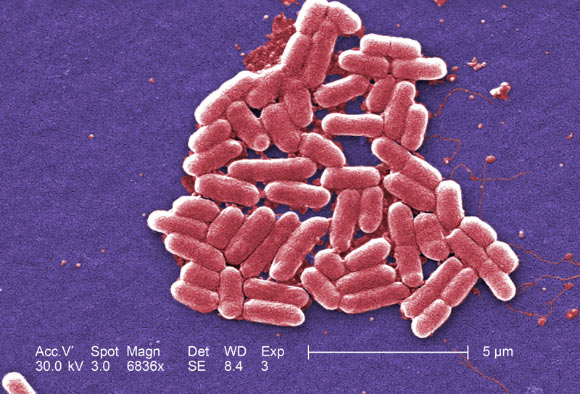An international team of researchers from Spain and the UK has found that the protein TLR2 (Toll-like receptor 2) — a critical detector of the microbiota found in the intestine — regulates levels of serotonin, a neurotransmitter intimately connected to the brain’s regulation of appetite, sleep, and mood.

Escherichia coli, a gram-negative bacterium of the genus Escherichia that is commonly found in the lower intestine of warm-blooded organisms. Image credit: CDC.
The study, carried out in cell cultures and verified in mice, provides strong evidence that microbiota can interfere with human physiology by modulating the serotonin transporter activity.
Serotonin transporter is a target for numerous diseases and it seems that microbiota living in our guts is able to interfere with this transporter, controlling our serotonin levels.
The finding, published in the journal PLoS ONE, comes as researchers are working to understand the complicated interactions between the ‘invisible world’ of the microbiota in our bodies and the impact they have on our health and even our moods.
Recently, scientists found evidence that the bacteria in the gut play a role in causing Parkinson’s disease.
It may also help explain how the gut microbiota affects our physiology.
Inflammatory bowel disease is thought to be triggered when TLR2 is not functioning properly, but so far, the mechanisms behind this have not been fully understood. The current study aimed to further this understanding.
“The new finding helped to further understanding in a fast-growing research area,” said study lead author Dr. Eva Latorre, from the University of Exeter Medical School.
“Our paper has concluded that the protein TLR2 alters the availability of serotonin, which is important in a range of conditions from depression to inflammatory bowel disease. It is early days in this research though.”
“We need to understand much more about the relationship between the microbiota in our guts and how they interact, before we can hope to harness effective new treatments.”
Dr. Latorre and co-authors examined human cells in a model of the intestine, looking at how they express proteins and RNA – activities which regulate how they behave.
The researchers found that TLR2 controls serotonin transporter – obtaining the same result in studies on mice.
“This paper opens our minds about the complex universe of this forgotten organ: the microbiome,” said senior author Prof. José E. Mesonero, from the University of Zaragoza.
“We have concluded that TLR2 not only can detect microbiota, but also modulate serotonin transport, one of the crucial mechanism in neurological and inflammatory diseases.”
“Much has to be yet studied, but this work can improve our understanding about the connection between gut and brain thought microbiota.”
_____
E. Latorre et al. 2016. Intestinal Serotonin Transporter Inhibition by Toll-Like Receptor 2 Activation. A Feedback Modulation. PLoS ONE 11 (12): e0169303; doi: 10.1371/journal.pone.0169303







